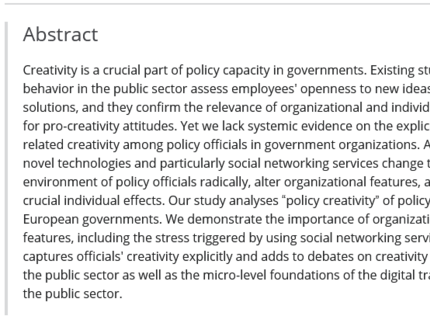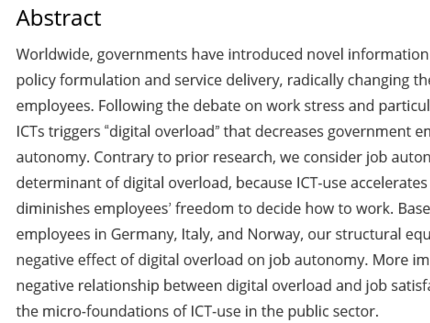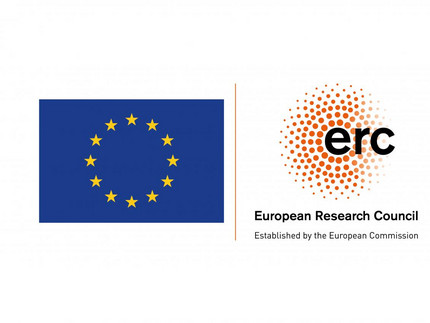New article on policy creativity in the digital era in Public Administration Review
Julia Fleischer and Camilla Wanckel have published an article about policy creativity in the digital era in Public Administration Review. For their study, they asked ministerial bureaucrats in Germany, Italy and Norway about their ministry’s organizational climate for innovation, their public service motivation as well as their stress level when using social media. The results indicate that social media stress impairs individual creativity in policy formulation processes, while an organizational climate for innovation and high levels of public service motivation positively relate to policy creativity. The survey data were collected as part of the EU Horizon 2020 research project TROPICO (Transforming into Open, Innovative and Collaborative Governments).
The article can be found here.
New article on digital overload in ministerial bureaucracies in Review of Public Personnel Administration
Julia Fleischer and Camilla Wanckel have published an article in Review of Public Personnel Administration about the influence of “digital overload” on ministerial bureaucrats’ perception of their job autonomy and, thus, their job satisfaction. Encompassing "communication overload" on the one hand and “techno-overload” on the other, the concept of "digital overload" assesses two dimensions of altered work environments in the digital era and indicated that accelerated routines and disruptions in policy formulation processes as caused by information and communication technologies (ICT) reduce bureaucrats’ autonomy and job satisfaction. The survey data from Germany, Italy and Norway were collected as part of the EU Horizon 2020 research project TROPICO (Transforming into Open, Innovative and Collaborative Governments).
The article can be found here.
Prof. Dr. Julia Fleischer receives ERC Consolidator Grant
In the latest round of ERC grants, Prof. Fleischer was successful and received an ERC Consolidator Grant for her research project "STATE-DNA".
The project "Evolutionary Government: Origins and Consequences of Structural Change in Government" (STATE-DNA) studies change in formal structures of government organizations at the level of individual units inside ministries and agencies. The causes and effects of this structural change are discussed in various debates, i.e., as the structural dimension of (administrative) state capacity, as substructures of ministerial portfolios, or as elements in the structure and organization of government and actors in executive policymaking.
STATE-DNA combines these perspectives and conceives these entities as the "building blocks" of the modern state, which can thus also be examined from an evolutionary biology perspective. Accordingly, the ERC project will use new theories and methods, including from the natural sciences, to investigate the origins and consequences of structural change in France, Germany, Japan, the Netherlands, Norway, and the United Kingdom from 1815 to 2025.
The ERC Consolidator Grant comes with funding of approx. 2 million euros and the project will run for 5 years.
Learn more about our project through our State-DNA-Website



